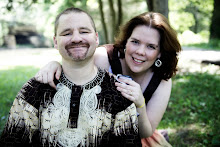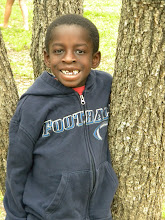The Poisenwood Bible
I picked up Barbara Kingsolver's The Poisonwood Bible about 5 years ago. I started reading it, and put it down within the first 100 pages. I realized this was not a book about a nice missionary family going into Africa. The missionary family was sort of twisted and very ignorant. It offended me at the time. I wasn't ready to read anything "bad" about missionaries (she chuckles to herself).
Since then I've been to Ghana. For some reason (I wonder why?!) after having been in Africa, the book all the sudden made much more sense to me. You probably don't have to be in Ghana for more than a few days before you come upon some well-meaning but totally out of control white person who things they will "save" the continent from itself. I now feel like this is an extremely egocentric view. Who says Africa needs saving? As a Christian, yes, I believe that people need to know Christ. But there is joy and patience and history in Africa that we Americans will never truly understand.
The Poisonwood Bible is now one of my favorite books. I just reread it for the 3rd time while Eric was in the hospital this week. I want to post some of my favorite passages in the book, just for fun.
Page 233: "In Kilanga, people knew nothing of things they might have had--a Frigidaire? a washer-dryer combination? Really, they'd sooner imagine a tree that could pull up its feet and go bake bread. It didn't occur to them to feel sorry for themselves. Except when children died--they they wept and howled. Anyone can recognize the raging injustice THERE. Buth otherwise I believe they were satisfied with their lot."
That passage speaks to me. I think we Americans assume others must be sad because they don't have the luxuries we have. Just. Not. True. Have we ever considered that those in what we consider to be "developing countries" don't WANT toilets in their homes? Maybe they think it's gross to do such things in the house. Do we ever think that they might prefer a bucket bath to a running water shower? I've heard that exact thing from my friends in Ghana. They don't necessarily feel that they are missing out on some of the things we Americans have come to rely on.
Page 4:13: "Hunger of the body is altogether different from the shallow, daily hunger of the belly. Those who have known this kind of hunger cannot entirely love, ever again, those who have not."
Very powerful for me. Three of my four children have experienced true hunger. A hunger that I have never, in my privileged life, had to endure. I do believe it has changed them. They each deal with their own ghosts. Now that Samren is 8, we see his tendency to overeat, and truly worry about who will get the left overs from dinner at night. We see Bright who steals and gorges sweet things. We see Kendi who cannot stand to watch food being prepared--it puts her into a state of stress that causes her to cry until the food is placed in front of her. These are just the ghosts we see so far. I believe that the hunger they have experienced will be with them throughout their entire lives. I pray that I can help them deal with their past in a healthy way--but they are very powerful ghosts.
Page 488-489: "It's impossible to describe the shock of return. I recall that I stood for the longest time staring at a neatly painted yellow line on a neatly formed cement curb. I pondered the human industry, the paint, the cement truck and concrete forms, all the resources that had gone into that one curb. For what? I could not quite think of the answer. So that no car would park there? Are there so many cars that America must be divided into places with and places without them? Was it always so, or did they multiply vastly, along with telephones and new shoes and transistor radios and cellophane-wrapped tomatoes, in our absence?
Then I stared for for a while at a traffic light, which was suspended elaborately on wires above the intersection. I couldn't look at the cars themselves. My brain was roaring from all the color and orchestrated metal movement. From the open building behind me came a blast of neutral-smelling air and a high hum of fluorescent lights. Even though I was outdoors, I felt a peculiar confinement. One discarded magazine lay on the edge of the street, impossibly clean and unblemished. A breeze gently turned the pages for me, one at a time: here was a neatly coiffed white mother beside a huge white clothes dryer and a fat white child and a great mound of bright clean clothes that would be sufficient, it seemed to me, to clothe a while village: here were a man and woman holding between them a Confederate flag on a vast lawn so flat and neatly trimmed their shadows stretched behind them for the length of a fallen tree; here was a blond woman in a black dress and pearls and long red fingernails leaning over a blank white table clothe toward a glass of wine; here was a child in many kinds of new clothes hugging a doll so clean and unrumpled it seemed not to belong to her; her was a woman in a coat and hat, hugging a bundle of argyle socks. The world seemed crowded and empty at the same time, devoid of smells, and extremely bright. I continued to stare at the traffic light, which glowed red. Suddenly a green arrow popped on, pointed left, and the row of cars like obedient animals all went left. I laughed out loud."
This passage was written from the perspective of a young person who had returned to America after less than 2 years in Africa. Just IMAGINE how our children must feel. I think this author might be right on. How vastly different is our life from the life that they have known? Our life--NOT BETTER than what they had before--just different. I'm' determined to remember this passage the next time I escort a child home from Ghana and they keep asking me, "Auntie Anita, when do we get to America?" even after we have long landed. They cannot comprehend what "America" is.
If you haven't ever read The Poisonwood Bible, I would recommend it. You might like it. You might hate it. But regardless, it might give you insight into your African-born child's life before you.
Anita










6 comments:
Thanks for sharing. It is definitely something that I would like to read.
Having spent over 6 weeks in Ghana (on 2 different trips) I have often thought about how Americans think that "we need to bring home all of the children" because "we have so much more than they do". But ... if that is the logical conclusion, than any millionaire could say that they should adopt my children because I can't provide "enough" for them. My children don't watch t.v. ... my children don't have xBoxes or Playstations ... my children don't all have their own computers or iPods or cell phones ... my children wear hand-me-down clothing ... my children wear jeans with holes in them ... So, logically, there are many American families that could "provide better" for them. But ... what is "better"? Where do you draw the line between necessity (clean water and food) and "just stuff".
Yes ... food is a necessity, and lack of food is a very legitimate reason that many children are placed for adoption. But, some people travel to these countries and all they see is what the people don't have, rather than what they do have.
I love the people of Ghana. We Americans could learn a lot from them, if we'd take the time to really get to know them.
I struggle when I'm there. How important is air conditioning? How important is high speed internet? How important is "good old American food"?
Thanks for giving us all something to think about, Anita.
:) :) :)
I love The Poisonwood Bible. I read it ages ago and it brought me right back to the things I was feeling after returning from a month-long trip to Tanzania.
Hmm...maybe I should pull it back off the bookshelf for another read?
Chanda
I think anytime you step outside of our American soil you realize how 'young' of a country we truly are.
We don't have a lot of patience in history - yet.....love that...patience.....meaning weathering the bad times with hope for the future...just love that.
You've talked about this topic on your blog before and it's always worth looking at our motives to want to help....
I'm seeing this now with Haiti. My friends all want to adopt....of course I want them to, but also know how difficult adoption can be....
UGH, never any good answers!!!!!
Thanks for the recommendation, I love the passages you quoted. I will see if I can check it out.
Barbara Kingsolver is amazing right?
This has been my favorite book for a long time. I don't think it gives missionaries in general a bad rap, it just points out the multitudes who DO think they are going over to be salvation... I constantly get frustrated with friends who want to send Bibles and toys to Africa, when really they need more vital things to survive (in some areas, I realize not all of Africa is poor with malaria outbreaks and such).
The last quote you posted was also one of my favorites! That and the comments on the grocery store trip, and after the mother is living in the States again she comments how Africa sneaks up on her still.
I'm glad you gave the book a chance and that it became a favorite!!!
Post a Comment